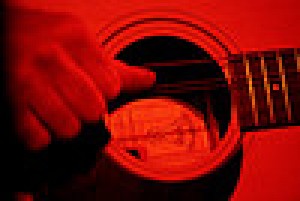Letters To students: (Including Myself)
Style and Musicality
Style and Musicality
Simplicity or complexity are not gauges of musicality or measures of artistry. Dig into your limitations, strengthen them, your style must conform to them!
Don't worry about your limitations. Step past the technique and into music making.
Be "sure footed" in those things you know will work for you.
NOTES TO STUDENTS (#1)
Take that which you can play, and make it as "musical" as possible!
The student will say "Iv'e been working on that part for ten minutes now and still can't get it to sound right".! The teacher replies, "don't worry" do it for another ten hours and it will sound much better".
The point is that it is difficult for the student to realize how much practice (repetition) it takes to sound like the artists they listen to.
They "The Masters" are like Olympic gold metal winners. They eat, breath, and sleep it. Even the most talented had to spend a lot of time learning to just go from chord to chord in "unbroken time" with no goofs or pauses. (I'm not talking here about pauses like getting up and grabing another beer out of the fridge, (although a break might help!). What I am talkin' about is that "clock" organizing the sounds. (Organized sound = Music)
The more you are plugged into that steady rhythm, the more musical your playing will sound. Even if you only know a few chords (actually just one will do) you can plug into a nice steady rhythm and sound musical.
We all forget how much time and effort it took to learn how to walk across the room without stumbling or falling back down. Or how much time and repetition we put into learning each word that built our vocabulary now used to speak in well formed complete sentences. Is there any reason our musical abilities should take less work?
Don't worry about what you can't play! (Just keep working at it.) Take that which you can play and make it as musical as possible! Put it into a solid rhythm. Maybe just one note bopin' along. Once you get the feeling of playing in solid time, it's easier to plug in new things. In other words, Build the foundation, the rhythm, then the house. Then start hanging all those cool things on the walls. Our minds are so ready to focus on the glittering details we may easily dismiss the simple elements that are holding the music together.
(c) 2007 Stan Hirsch
Bringing that Fuzzy Ball Of Sound into Focus
Bringing that Fuzzy Ball Of Sound into Focus
-Stan Hirsch -
What you practice should depend on the outcome you desire.
If you can get a clear vision of exactly what that is you desire to learn, then the lesson plans are easily drawn up.
Do you really know how you want that music you are working on to sound?
Do you hear it clear enough to vocalize it?
Try to get a clear vision of it -
where it is not just some fuzzy ball of sound that's out there.
Talk To Your Hand
"Talk to your hand"
Why do we use our strongest hand for the strumming or picking? Because we need that accuracy and strength for the most fundamental and important part of music making; The rhythm! Most of us forget this because we become unavoidably preoccupied with the fretting hand and all the flashing, shinny, glittering details. You know-this little "lick", running up there! (This includes the camera men shooting music videos.)
For most of the lessons I recommend damping the strings (by lightly placing your left hand on them) and working your right hand on the "strum". This will create a percussive sound and really bring out what that right hand is doing. We want to do that because this right hand -playing in good strong time-is the dictator! (Unless you're left handed.)
This is the hand God gave you to create the groove. The left hand (and all them notes, chords, etc...) need to fall in line with that. Of course when you're learning new chords, licks, scales, stuff, whatever; attention has to be directed to your left hand fingers. But don't start thinking that this is the important part. Figure out what you need to do, then direct that attention back into plugging that stuff in line with the right hand: You know, where the music is made!
Vocalizing- Your voice, the act of vocalizing things, has a very unique pathway to and from your mind. Vocalizing is a direct link to thought-and to creating reality. (Hearing the music then having it materialize as sound.) It is a way of placing musical patterns firmly in your mind and then coaching your hands. If you can vocalize the rhythmic patterns alone, or rhythmic patterns attached to arranged notes then you've got it! All you have to do now is teach it to your hands. (Not always quick or easy.)
All musicians who play any music (complex or simple) that sounds solid can vocalize what it is they are playing. From the basic rhythm to the most complex arrangement of notes. This does not mean they can "sing" them in perfect pitch (although some can), but they can vocalize the phrasing (rhythm). They hear the part (inside their head) and can bring it out into the physical world by vocalizing it. Then play it on their instrument.
(c)2007 Stan Hirsch
NOTES TO STUDENTS(#2)
Notes to the Students:(#2)
The tone and dynamics of the sounds made by the hands, coming thru your guitar, are a step beyond the correct note pitches and rhythms. You may be playing the same notes in the same order as another guitarist- but it doesn't sound the same. If it sounds somehow better to you, the chances are that artist has more control of the dynamics- sometimes very subtle.
If you can hear the difference- congratulations! You are then closer to controlling those dynamics.
When you're playing in the groove it feels effortless. It's a river that's flowing, and you just jump in, floating on the current, and standing on the bank. Playing the music- being totally into it, while also standing back and listening to yourself. (You can do this with just one chord or note! Don't think you have to wait until you know more about guitar and guitar playing - or theory, or anything else.)
You need to work your hands- get them strong enough on the technique to go beyond the physical and into musical expression.
Don't add information-(at the cost of deepening your understanding of these very basic music making ingredients.)
Disclaimer:There are a lot of valid (and not so valid)exceptions to just about everything I teach. (c)2007 Stan Hirsch
(See the sub-section on this page- Dynamics of a movin' groove.)
NOTES TO STUDENTS (#3)
Learning to play a musical instrument well is really no harder than just learning to walk, skip, jump and talk.
That which makes it seem hard is the fact that in most peoples lives learning to play an instrument well is not as valued as those other things. Therefore not as much time or effort has been put into it.
Dynamics of a Moving Groove





